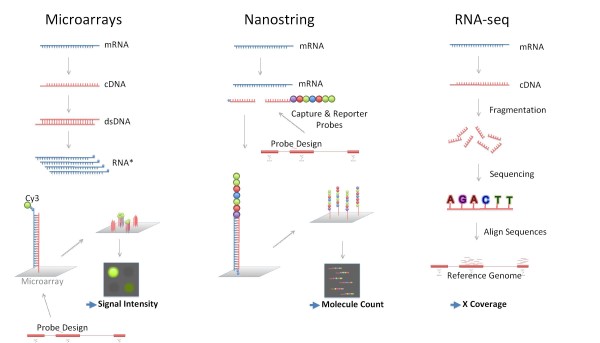RNA Profiling Service
RNA profiling has become a key tool for modern drug discovery and comprehensive transcriptome study. By investigating the total cellular content of RNAs such as mRNA, rRNA, and tRNA, researchers could connect the information on the genome with its functional protein expression. Based on advanced high-throughput technology and top platform, Creative Biolabs is committed to offering global customers RNA profiling services in the most high-quality and cost-effective way. Our professional scientists assure the sample preparation expertise and quality data that you seek.
Background of RNA Profiling
During the past years, multiple technologies have been developed for transcriptome profiling including real-time PCR technology, RNA microarrays, Nanostring technology, and RNA sequencing (RNA-seq) technology. Among these technologies, RNA-seq is expected to become sufficiently cost-effective and practical that it will eventually supersede microarray technologies. Compared with traditional methods, RNA-seq has many advantages including the ability to produce highly accurate and quantitative readouts of gene expression levels for the entire transcriptome, sensitivity for even very lowly expressed genes, and the capability to identify alternatively spliced transcripts, novel transcripts, and fusion gene transcripts. Recently, RNA-seq has been applied to multiple areas in drug discovery and development, including (1) identification of drug-related genes; (2) identification of fusion proteins in cancer; (3) identification of miRNAs involved in the development of drug resistance.
 Figure 1. RNA profiling technologies. (Chaussabel, 2010)
Figure 1. RNA profiling technologies. (Chaussabel, 2010)
Services Available at Creative Biolabs
- Total RNA Profiling - Total RNA profiling aims to sequence the whole transcriptome which includes coding and non-coding RNAs. After ribosomal RNA removed from total RNA samples, this analysis is optimal for finding biomarkers from known transcripts and new RNA features.
- Small RNA Analysis - Small RNA analysis makes it possible to discover, measure and compare the expression levels of specific microRNAs. Also, it allows the detection of novel microRNA targets.
- mRNA Profiling - Sequencing of messenger RNA-seq allows accurate estimation of transcript abundance for differential expression analysis as well as the study of alternative splicing and discovery of new transcript isoforms.
Service Workflow
With professional bioinformatics capability, Creative Biolabs offers high-quality services in each step of your RNA profiling programs. Firstly, our experienced staff will provide professional advice on experiment planning, which includes but not limited to the RNA purification method, reference genome selection. After these points have been considered, cDNA library preparation and final QC prior to sequencing (quantification and fragment size) will be conducted by our scientists. Then the cDNA library will be sequenced to the desired depth by the required sequencing platform and final RNA-seq data will be analyzed by our bioinformatics analyst.
Features of Our Service
- Wide range sample resources including liquid biopsies, fresh frozen and FFPE tissue, exosomes, serum, or plasma.
- Strict quality control to make sure cDNA library preparation a success.
- Deep data mining: final data will be further analyzed with other types of epigenomic datasets (ChIP-seq, RRBS, ATAC-seq, etc.).
- Short turnaround time with relatively low prices.
As a leading company in RNA profiling, Creative Biolabs is dedicated to offering the optimal approach for microRNA and RNA analysis in your clinical trial samples. For more detailed information, please feel free to contact us.
Reference
- Chaussabel, D.; et al. (2010). Assessing the human immune system through blood transcriptomics. BMC biology. 8(1), p.84. Distributed under Open Access license CC BY 4.0, without modification.
